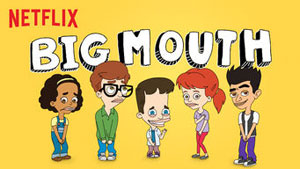Netflix’s “Big Mouth” – which recently released its second season — marks the latest sea change in Things You Can Do on Television, as it chronicles 12- and 13-year-olds entering puberty. But unlike “The Simpsons” in the 1990s and “Family Guy” in the 2000s, there has been little hand-wringing from parents’ TV groups about “Big Mouth,” which opens with episodes where Andrew (John Mulaney) ejaculates in his drawers at a school dance and Jessi (Jessi Klein) has her first period on a field trip while wearing white shorts. Fortunately for its creators, “Big Mouth” also exists in the most prolific age of TV history: There’s so much out there that watchdog groups can’t keep up.
Here are my thoughts on the first two 10-episode seasons:
Season 1 (2017)
Out of the gates, “Big Mouth” isn’t a broad picture of entering puberty like “Eighth Grade,” the best movie of 2018 so far. Instead, it aggressively focuses on the sexual development of Andrew, Jessi, Jay (Jason Mantzoukas), Nick (Nick Kroll) and Missy (Jenny Slate), or lack thereof in the case of the latter two. Nick looks exactly like Kroll, and must certainly be based on him. I’ve also heard the creators say that stories like Jessi looking at her genitals (Kristen Wiig) with a mirror come from their real-life experiences. The writers’ personal link to the kids keeps “Big Mouth” from being too icky, and of course the fact that it’s animated is why the writers are making future seasons rather than sitting in prison.
It’s an adult show that could only exist in this generation, for the aforementioned reasons and because this is the era of the underdeveloped adult: The stuff we giggled at in eighth-grade health class is still giggle-worthy. Beyond that, the show has wonderfully specific premises, from Jessi feeling both sexy and uncomfortable in her red bra to Andrew getting addicted to porn as a psychological compulsion, rather than something he enjoys. “Big Mouth” embraces the awkwardness, leans into it, rolls around in it; MTV’s “Awkward” would hold up its hands to “Big Mouth” and say “This is too much.”
In addition to providing impromptu anatomy lessons – it sets a record for the use of “pubis mons” in dialogue – “Big Mouth” cares about its characters and is emotionally true. Among the best musical interludes (it cribs from the “Simpsons” structure in that way) in Season 1 is Andrew’s expression of his love for Missy, which involves “a boner in (his) heart.” I can’t recall animated characters I’ve shipped as hard as Andrew and Missy, who throw up in their mouths a little when thinking about the other (trust me, it’s really cute). Even with “Futurama’s” Fry and Leela, it’s more inevitable than organic.
Sometimes “Big Mouth” strays into beating a joke into the ground (no pun intended … OK, it kind of is), like the entire episode about Jay humping his pillow. The pillow, Pam (Kristen Bell), gets pregnant and gives birth to a son, whose father is actually Jay’s brother. This is slightly too absurdist for my tastes, as is the Sylvester Stallone-guided Pornscape.

The series’ permanent fantasy elements work well, though. The Ghost of Duke Ellington (Jordan Peele) lives in Andrew’s attic, gives him inappropriate advice and laughs at Andrew’s small penis — although he means well. (I wonder what Ellington’s estate thinks about this character.) The Hormone Monster (Kroll) serves as the sexually charged side of Andrew’s consciousness, and Jay’s.
My favorite character is the Hormone Monstress, first of all because it shows “Big Mouth’s” gender balance and she’s central to the controversial revelation that “girls are horny too” – a fact that causes all the guys’ heads to explode, including the Hormone Monster’s. I love her huge grin, barely constrained sexuality and the deliciously over-the-top vocal performance by Maya Rudolph. It’s both perfect and a wonderful surprise that the Monster and the Monstress – actually named Maurice and Connie – have on-again, off-again flings.
The show flirts with the “kids acting like adults” trope, like when Nick and Andrew sneak off to New York City for a day, but falls comfortably short of Stewie in “Family Guy.” When Nick and Andrew get in over their heads, they verbally recognize they are children, and not ready for this.
“Big Mouth” mostly stays in the emotional headspace of middle schoolers, inviting adult viewers to revisit old fears. I can’t deny the harsh reality of the episode where Nick and Andrew go to a sleepover at Jay’s. A scary dog greets them. They are instructed to not enter a certain room. Jay’s older brothers are the stuff of horror movies (and admittedly exaggerated for dark humor when they devise a game involving ejaculating onto a cracker). And ultimately Jay’s mom is not on Nick’s and Andrew’s side. It’s the classic situation where a sort-of-friend’s house is frighteningly alien.
It’ll be interesting to find out if “Big Mouth” strays from the “Simpsons” and “Family Guy” template and lets its characters age. On one hand, I’d guess it won’t, because animated TV shows simply don’t do that. On the other hand, I suspect it will, because keeping these kids perpetually 12-13 years old seems too cruel.
4.5 stars
Season 2 (2018)
I found Season 2 to be a notch below the first because the initial surprise factor has passed. But many people find this season to be superior, and I can see that point of view. Season 2 is still consistently funny, it pushes the envelope further – for example, the musical number at a women’s spa that celebrates any and all body types – and it advances characters and plots, becoming somewhat like “Eighth Grade” in that way. But lest you think “Big Mouth” is maturing, Jay humps a pillow store’s worth of pillows this year.
The Shame Wizard (David Thewlis, Professor Lupin from “Harry Potter”) is the season’s breakout character, a Dementor-type who floats around riddling people with guilt rather than terror. “Big Mouth” makes an interesting case that the Shame Wizard is a necessary evil; when he departs the school gym sleepover – frustrated that he’s unable to drive the mentally underdeveloped Coach Steve (Kroll) to self-loathing – the place descends into chaos. Previously embarrassing moments – Missy humping her stuffed glow-worm in her sleep, for instance – become accepted as normal, which is arguably a good thing. But the fires and defecation around the school are not so good.
The Depression Kitty (Jean Smart) illustrates Jessi’s mental state; it’s funny, but we can tell the writers are taking depression seriously. (As comedy writers, no doubt many of them deal with the condition.) Tired of fighting with her mom, being sad that her dad moved out, and being angry about everything else, Jessi ditches Hormone Monstress Connie – who is an awful influence, although she means well — and decides a depressed funk in the company of the soft-spoken cat is the most satisfying choice, before her friends pull her out of it.
Nick’s quest to reach puberty takes interesting turns. Tyler (John Gemberling), the apprentice Hormone Monster who himself hasn’t hit puberty (as signified by the development of his horn), is a step up from the deformed Rick (who is also Coach Steve’s Hormone Monster), but not ideal. In a finale twist that will require some explanation in Season 3, Connie gets assigned to Nick.
Season 2 delves into deeper issues – divorce, the Friend Zone, sex education – asking a viewer to think between chuckles. In its riskiest move, “Big Mouth” uses an episode as a PSA for Planned Parenthood. The skits about birth control options and STD myths clear up misinformation about what the group does, and I can imagine this episode being screened in public-school health classes a decade from now, when more societal taboos have gone by the wayside. But even with lampshades hung all over the episode, it’s distracting that the kids take on the points of view of their adult creators.
That episode takes some of the innocence out of “Big Mouth.” But given the series’ subject matter, I guess that’s fitting.
4 stars

